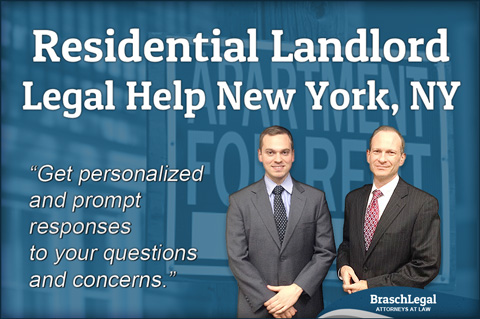Landlord Information for Co-op/Condominium, Market Rate, Rent Controlled and Rent Stabilized Tenants

The Law Offices of Justin C. Brasch has extensive experience helping Landlords in New York.
There are two basic types of Residential Eviction Lawsuits:
- Nonpayment Lawsuits – Where a landlord sues for Nonpayment of Rent
- Holdover Lawsuits – Where a landlord sues for violations of the Lease and Law
Landlord-Tenant Proceedings: Co-op/Condominium, Market Rate, Rent Controlled and Rent Stabilized Tenants
- Nonpayment or Late Payment of Rent
- Expired Lease or Sublease
- Month-to-Month Tenancies
- Illegal Subletting or Assignment
- Nuisance
- Unauthorized Alteration or Illegal Use
- Dangerous or Illegal Conditions
- Breach of Lease
- Non-Primary Residence
New York Tenant Protection Act of 2019
In 2019, New York passed the Tenant Protection Act that dramatically affects how landlords sue tenants. The law requires landlords to comply with specific requirements regarding the documents that must be served before a landlord can sue a tenant.
Non-Payment Proceedings – Required Notices
If a tenant fails to pay rent, a landlord is required to send the tenant a 5 Day Rent Letter, then a 14 Day Rent Demand, before filing and serving a lawsuit known as a Notice of Petition and Petition.
Holdover Proceedings – Required Notices
The new law creates specific notice requirements for suing tenants with expired leases and Month-to-Month Holdover Tenants. (NY Real Prop. § 226-c.)
- A 30-Day Notice – for tenants who have rented less than 1 year; or have a lease term of less than one year.
- A 60-Day Notice – for tenants who have rented more than 1 year but less than 2 years.
- A 90-Day Notice – for tenants who have rented for more than 2 years.
Required Notices to Raise Rent More than 5%
In New York, landlords must now provide tenants with advance notice if they intend to increase the rent by 5% or more: (NY Real Prop. § 226-c.)
- A 30-Day Notice – for tenants who have rented less than 1 year; or have a lease term of less than one year.
- A 60-Day Notice – for tenants who have rented more than 1 year but less than 2 years.
- A 90-Day Notice – for tenants who have rented for more than 2 years.
If the landlord fails to provide the appropriate notice, the tenant may continue at the existing rental rate, even if the lease has expired. The landlord may not evict the tenant for failing to pay the increased rental amount.
Rent Deregulation
It has become much harder to deregulate Rent Stabilized and Rent Controlled Apartments after passage of the Tenant Protection Act of 2019. Co-ops and Condominiums can usually be deregulated upon vacancy. Additionally, apartments can often be deregulated by combining vacant apartments. This can be complicated and The Law Offices of Justin C. Brasch are experienced in evaluating and assisting landlords concerning the deregulation of NYC apartments. Contact Justin Brasch now, or call him to arrange for an initial consultation – 212-267-2500.
If you are a Residential Landlord in New York and need legal advice, Justin Brasch can provide accurate legal direction to resolve your matter in an efficient and affordable manner. Mr. Brasch strives to prevent litigation. However, when it is unavoidable, his office aggressively pursues it to meet clients’ goals. Contact Justin Brasch now, or call him to arrange for an initial consultation – 212-267-2500.
Sublet, Assignment, Occupancy and Nonprimary Residence
Sublet: A sublet is a temporary transfer of a tenant’s interest (the lease) in an NYC property to another person. The tenant who sublets their interest to another person is known as the prime tenant, while the person to whom the apartment is sublet is known as the subtenant/sublessee. In a sublet, the prime tenant must abide by the rent stabilization rules that govern subletting. The Tenant is expected to return to the apartment and the landlord cannot unreasonably reject the sublet application. Tenants that illegally sublet their apartments can be evicted.
Assignment: An assignment is the transfer of a tenant’s interest (the lease) in an NYC property to another person. A lease assignment gives another person all of the tenant’s rights. Tenants that illegally assign their apartments can be evicted.
Occupancy: Under Rent Stabilization a person, other than a tenant or a member of a tenant’s immediate family, can occupy a premise with the consent of the tenant. But, such a person shall not be considered a tenant for the purposes of the Rent Stabilization Code.
Nonprimary Residence: A Rent Controlled or Rent Stabilized Tenant must use the apartment as their primary residence. If it is not their primary residence, meaning they live elsewhere, the tenant can be evicted.
The laws in New York to sue and evict residential tenants are very complicated. At the Law Offices of Justin C. Brasch, we are experienced in evaluating and handling matters concerning Nonpayment of Rent, Expired Leases, Month-to Month Tenancies, Illegal Sublet/Assignment, Breach of Lease, Non-Primary Residence, Nuisance, Illegal Use and others.
The Law Offices of Justin C. Brasch can help you understand your rights as a Landlord under this new law and assist you with collecting rent and evictions.




